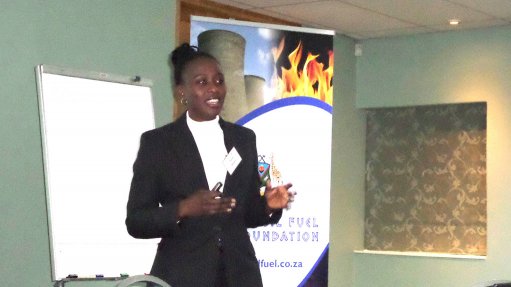
MACHINIBA SYLVIA BOPAPE Globally, growing pressure is being placed on countries to reduce greenhouse-gas emissions produced by burning coal in power stations
South Africa has a coal-based energy trilemma, namely balancing the need for environmental sustainability, energy equity and energy security, says State-owned power utility Eskom coal supply unit manager Machiniba Sylvia Bopape.
Bopape is currently studying towards a doctorate in metallurgy and materials engineering at the University of the Witwatersrand, in Johannesburg.
She explains that a trilemma is a difficult choice or the achievement of a balance between three options, where success in the achievement of any of the options would come at the expense of the others.
Bopape says that the 2015 World Energy Council’s report highlights the global energy trilemma, as it notes that countries need to secure their energy supply and demand in an environment-friendly manner, while balancing this with ensuring accessibility and affordability of energy for countries’ populations.
Additionally, the report points out that the effective management of primary energy supply, the reliability of energy infrastructure and the ability of energy producers to meet current and future energy demands are goals governments need to focus on.
Bopape states that, globally, growing pressure is being placed on countries to reduce greenhouse-gas (GHG) emissions produced by burning coal in power stations, as this is closely associated with the growth in environment-related illnesses.
Nonetheless, she points out that, in South Africa, 86% of the population have access to electricity, with about 7.6-million people still requiring access to the national power grid.
Bopape points out that President Jacob Zuma told the World Economic Forum, in Davos-Klosters, Switzerland, that South Africa’s electricity infrastructure was not designed to serve 11-million households and needed greater investment in infrastructure to meet demand.
She stresses that the supply of affordable and reliable energy is essential for economic development and it is a significant contributor to the alleviation of poverty, improved health and a better quality of life for all South Africans.
“However, a focus on a GHG emissions reduction may impede energy security and access, while a focus on increasing access may impact energy security and environmental sustainability. This is the trilemma government, industry and society will have to address effectively if we are to overcome the power and environment challenges the country faces,” Bopape concludes.
Bopape was speaking at the Fossil Fuel Foundation’s Independent Power Generation workshop, which took place in Johannesburg in July.